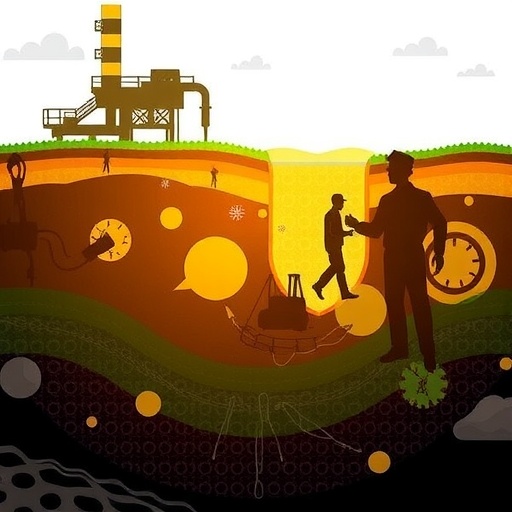In recent explorations of natural gas wells, a groundbreaking study has emerged, shedding light on the intricate microbial processes that drive organic matter degradation and methanogenesis. Conducted by a team of researchers, including Moore, Caldwell Eldridge, and Tomaszewski, the study utilizes cutting-edge metaproteomics and metagenomics techniques, offering new insights into how microorganisms orchestrate the transformation of organic materials deep within the earth’s crust. These findings are not only pivotal for understanding natural gas production but also bring forth new perspectives on microbial ecology and climate change mitigation strategies.
The research focuses specifically on a marginally producing natural gas well—a site that, despite its lower production rates, is teeming with microbial life that plays a critical role in the biogas production process. The researchers employed advanced metagenomic sequencing to catalog the diverse array of microbial species present in the well, revealing a complex community of bacteria and archaea. This community is responsible for breaking down organic matter and converting it into methane, which is an important component of natural gas and a significant greenhouse gas.
One of the significant findings of the study is the identification of specific microbial pathways involved in organic matter degradation. The researchers discovered that certain bacteria specialize in degrading complex organic compounds, breaking them down into simpler molecules that are more easily utilized by other members of the microbial community. This process not only enhances the efficiency of methane production but also highlights the interconnectedness of microbial species within these ecosystems.
Moreover, the research delved deep into the genes and proteins expressed by the microorganisms in the gas well, providing a comprehensive view of their metabolic capabilities. Through metaproteomics, the team was able to quantify the proteins produced by the microbial community, revealing which organisms are most active and which metabolic pathways are predominant during organic matter decomposition. Such insights are crucial for optimizing biogas production strategies in natural gas extraction processes.
The study also emphasizes the role of methanogenic archaea, a group of microorganisms that play a crucial role in methane production. By converting hydrogen and carbon dioxide into methane, these organisms are essential for sustaining the natural gas supply. The findings indicate that certain methanogens thrive in low-energy environments, often found in marginal gas wells, where they exploit available substrates to produce methane efficiently.
Additionally, the researchers examined how environmental conditions, such as temperature and pressure, impact microbial activity and the efficiency of organic matter degradation. This understanding can lead to improved management practices for natural gas production, enhancing yield while minimizing ecological impacts. The interplay between microbial metabolism and these environmental factors underscores the importance of tailored approaches to harness the full potential of biogas production in various settings.
The implications of this research extend beyond the natural gas industry. As global energy demands continue to rise, understanding microbial processes in energy production is vital for developing sustainable practices. The knowledge gained from this study could inspire innovations in biotechnological applications, where engineered microorganisms could be utilized to enhance biogas production or even contribute to carbon capture solutions.
Furthermore, the study serves as a reminder of the integral role that microorganisms play in the carbon cycle. As organic matter is broken down and transformed into methane, it is essential to consider how these processes can be managed to align with climate goals. The balance between harnessing microbial capabilities for energy production and mitigating greenhouse gas emissions is a complex challenge that demands collaborative efforts across disciplines.
As researchers continue to explore the microbiomes of natural gas wells, the questions surrounding the efficiency and sustainability of methane production remain at the forefront. Future studies will likely focus on the interactions between different microbial species within these environments, as well as how these interactions may be influenced by external factors such as climate change and human activity.
The exploration of microbial communities in energy production not only contributes to scientific knowledge but also underscores the need for a more holistic approach to natural resource exploitation. By embracing the complexities of these ecosystems, researchers can develop strategies that not only boost energy production but also protect the environment and promote biodiversity.
In conclusion, the groundbreaking findings from Moore and colleagues highlight the intricate relationships between microorganisms and their ability to transform organic materials into valuable energy resources. As we delve deeper into the biogeochemistry of natural gas wells, the role of microbial ecology will undoubtedly shape the future of energy production, offering pathways toward a more sustainable and environmentally friendly energy landscape.
Through the lens of this research, it becomes increasingly clear that the future of energy is not solely reliant on technology but rather intertwined with the delicate tapestry of life beneath our feet. Acknowledging and harnessing these microbial processes may well hold the key to unlocking new potentials in the quest for sustainable energy solutions.
Subject of Research: Microbial pathways of organic matter degradation and methanogenesis in natural gas wells
Article Title: Metaproteomics and metagenomics reveal microbial pathways of organic matter degradation and methanogenesis in a marginally producing natural gas well.
Article References:
Moore, E.K., Caldwell Eldridge, S.L., Tomaszewski, E.J. et al. Metaproteomics and metagenomics reveal microbial pathways of organic matter degradation and methanogenesis in a marginally producing natural gas well.
Commun Earth Environ 6, 873 (2025). https://doi.org/10.1038/s43247-025-02776-2
Image Credits: AI Generated
DOI: https://doi.org/10.1038/s43247-025-02776-2
Keywords: Microbial pathways, Organic matter degradation, Methanogenesis, Natural gas wells, Metaproteomics, Metagenomics, Sustainable energy, Biogas production, Methane, Microbial ecology, Carbon cycle.




